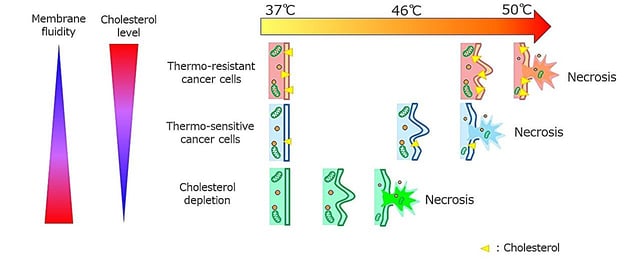Overview
- High cholesterol in cancer cell membranes suppresses heat-induced membrane fluidity and protects tumors from hyperthermia-triggered necrosis
- Cholesterol-depleting drugs rendered previously heat-resistant cancer cells vulnerable to 50 °C heat in multiple human and mouse cell lines
- In vivo studies showed combined cholesterol depletion and localized hyperthermia caused dramatic tumor shrinkage compared with heat treatment alone
- Measuring tumor cholesterol content may serve as a biomarker to predict which patients will benefit most from hyperthermia therapy
- Integrating cholesterol-targeting agents with hyperthermia holds promise to amplify anti-tumor immunity and improve overall treatment outcomes
